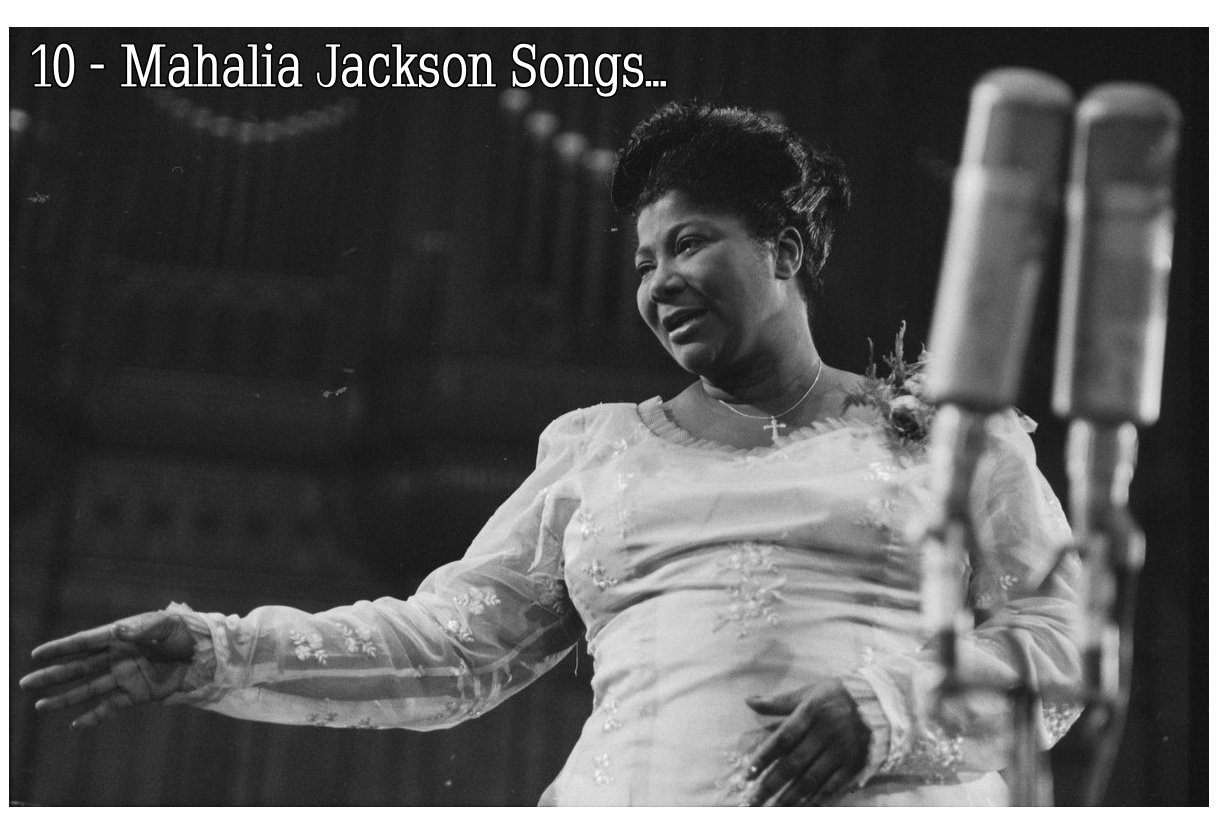(ThyBlackMan.com) When Mahalia Jackson sings, Heaven listens. And if you’ve ever had one of her songs catch you mid-tear, mid-praise, or mid-testimony — then you already know the power she holds. After we shared our first Mahalia list, y’all came through with the emails, the messages, the comments — “We need more!” And how could we not answer that call?
So here we are, family — lifting up 10 more songs from the Queen of Gospel that might not get as much shine as her biggest hits, but they’ll speak straight to your spirit. These are the tracks that meet you in your quiet place, that remind you God’s still on the throne, and that no matter what life throws your way — faith still wins.
This ain’t just a playlist — it’s a spiritual experience. So take your time. Let each song wash over you. And when you’re done? Let us know in the comments which Mahalia track blesses you the most. This is a community that loves gospel, honors greatness, and above all else — gives God the glory. Amen and amen.

1. “I Found the Answer”
“I Found the Answer” is one of Mahalia Jackson’s most serene and spiritually reassuring performances. The song opens with a gentle piano arrangement that perfectly sets the stage for Jackson’s introspective delivery. It’s not a track of vocal fireworks, but one of quiet strength and soulful assurance. Her voice wraps around the lyrics like a blanket of comfort: “I found the answer, I learned to pray.” In this moment, Jackson becomes less of a singer and more of a messenger — delivering gospel truths that transcend denomination or creed.
What makes this recording so deeply compelling is its understated power. Jackson doesn’t force a spiritual breakthrough upon the listener — she gently guides them toward one. The way she lingers on certain words and softly modulates her tone reflects a mature understanding of when to step forward vocally and when to step back. This is a song that whispers its message instead of shouting it, and yet the impact is seismic for anyone truly listening. Her belief isn’t just heard — it’s felt, resonating in the chest like a quiet wind through an open church window.
The track is particularly poignant in today’s anxious, fast-paced society. In an age where instant gratification reigns, Jackson’s message of patient faith feels almost revolutionary. “Keep your Bible with you, read it every day,” she urges, reminding listeners of the power of slow, steadfast spiritual practice. The song offers both testimony and instruction, encouraging listeners to turn to prayer not just in times of crisis but as a way of life.
Mahalia’s ability to maintain warmth and wisdom in every note elevates this recording. It’s the kind of song that feels tailor-made for those quiet moments when life feels too heavy. More than half a century later, “I Found the Answer” remains an anthem of resilience for any generation willing to stop and listen. It’s not just a spiritual guide — it’s also a reminder of the restorative power of music itself, something we too often overlook in our chaotic lives.
2. “It Is No Secret (What God Can Do)”
In “It Is No Secret,” Mahalia Jackson delivers one of her most intimate vocal performances. Originally penned by Stuart Hamblen, the song had already found success among country audiences, but Jackson brought it into the gospel fold with a conviction that few others could match. Her voice is both tender and commanding, showing her rare ability to express vulnerability and power in the same breath.
The way Mahalia interprets the melody elevates the song beyond its origins. Her phrasing is meticulous, deliberate. She uses pauses to let the meaning settle — especially in the iconic line, “What He’s done for others, He’ll do for you.” Her voice doesn’t just recite those lyrics; it inhabits them. There’s no pretense in her delivery — just a deep, seasoned trust in God’s transformative grace. Her vocal vibrato rises and falls like a gentle tide, and with each swell, she pulls the listener closer to the promise embedded in the message.
The song’s lyrical promise — that God’s grace knows no boundaries — is echoed in Jackson’s delivery. She leans into every line, especially the refrain. There’s no hint of performance here — it’s pure proclamation, wrapped in one of gospel music’s most soothing arrangements. What makes this track so powerful is how it bridges the gap between personal testimony and communal affirmation. Listeners don’t just witness Mahalia’s faith — they are invited to claim it for themselves.
In our current era, where belief systems are often met with skepticism or resistance, Jackson’s rendering of this classic remains striking. It’s a universal invitation to believe again — in hope, in mercy, and in the quiet possibility of miracles. This is the kind of song that lives in the heart long after it’s over. Whether you’re experiencing joy or sorrow, doubt or clarity, “It Is No Secret” remains a sacred companion, whispering to your soul that you are not forgotten.
3. “In the Upper Room”
“In the Upper Room” is a nine-minute gospel epic that stands as one of Mahalia Jackson’s most dramatic and spiritually intense recordings. Divided into multiple emotional arcs, the song builds slowly, starting with a contemplative mood before erupting into full-blown praise. Jackson’s vocal control is masterful here — she crescendos at just the right moments, drawing the listener deeper into the narrative of Jesus’ final moments with His disciples.
As the song progresses, it becomes clear that Jackson is doing far more than singing — she is embodying the emotions of a people who know what it means to struggle, to hope, and to wait for deliverance. The initial verses are meditative, creating a sacred atmosphere akin to a prayer vigil. But then the energy shifts. Mahalia’s voice begins to climb, layer by layer, carrying the emotional weight of the Christian experience. It becomes a symphony of sorrow and glory, heartbreak and triumph — all within one continuous breath of worship.
There’s something cinematic about the structure of this piece. The listener feels like they’re not just hearing a song, but participating in a sacred ritual. Jackson’s voice moans and soars, each note rising with increasing urgency as she channels both grief and glory. The backing choir follows her lead, never overpowering but always supporting, like a congregation moved to tears. When she sings “In the upper room with Jesus,” you can hear the trembling joy in her voice — a soul crying out in reunion with the divine.
Few gospel songs manage to blur the line between storytelling and spiritual trance as effectively as this one. “In the Upper Room” is not background music — it’s a full spiritual encounter. For today’s listener — weary from the noise of social media and the fatigue of daily grind — this song serves as a spiritual reset button. It reminds us that faith is not just a Sunday affair, but a deeply personal and emotional journey — one where we meet both ourselves and God in the quiet, holy spaces of life.
4. “Come to Jesus”
“Come to Jesus” might be one of Jackson’s most underrated songs in terms of vocal precision and emotional layering. It begins like a lullaby, her voice gentle yet resolute, calling the sinner to repentance with a tone that’s more loving mother than stern preacher. There’s a sweetness here that many of her more famous songs don’t lean into quite as strongly. That opening line—soft, almost whispered—feels like Mahalia reaching across the threshold of someone’s troubled heart, not demanding change but lovingly inviting it.
The spiritual weight of “Come to Jesus” rests not in its volume, but in its persuasion. It’s a song of invitation, and Jackson delivers it with the seasoned cadence of someone who’s witnessed both suffering and salvation. Her ability to stretch out syllables and hold them — not just for effect, but for emotional emphasis — is masterful. “Come… to… Je-sus,” she sings, and each word feels like it’s been carved out of her soul. There’s a tender ache in her voice that suggests she’s been where the listener is and found her way home.
As the song progresses, the emotional arc expands. What begins as a whisper becomes a roar — not of condemnation, but of compassion. Jackson builds the track into a crescendo that feels like a spiritual breakthrough. She turns what could be a quiet invitation into a revival call, commanding attention not with force, but with unmistakable truth.
This song still resonates in today’s landscape of spiritual searching and existential questioning. Whether you’re devout or just spiritually curious, “Come to Jesus” feels like a gentle knock at the door of your heart. It’s a track for the brokenhearted, the disillusioned, and the seeking — a spiritual lighthouse for anyone who feels lost in the storm. In Jackson’s voice, there’s no judgment — only grace.
5. “Let the Church Roll On”
“Let the Church Roll On” captures Mahalia Jackson in her most jubilant, foot-stomping form. A rousing, call-and-response style gospel song, it brings the energy of a full Sunday service straight to the listener’s ears. The lyrics are simple, almost repetitive, but therein lies the brilliance. It’s not about lyrical complexity — it’s about communal energy and spiritual revival. Jackson makes it impossible to sit still, summoning up the same joy and unity that fills a sanctuary during a spirit-filled service.
There’s a performative spontaneity in this recording that feels live, even if it was cut in a studio. The handclaps, the shout-outs, the soaring declarations of faith — all of it creates the sonic architecture of a gathering where everyone knows they’re welcome. Jackson doesn’t just sing — she orchestrates a spiritual parade. “Let the church roll on” is more than a phrase — it’s a commandment to persevere, to endure, and to celebrate while doing it.
This song is proof of Jackson’s ability to be a unifier. You don’t just listen to “Let the Church Roll On” — you join it. You sing along. You clap your hands. The church becomes metaphorical and literal, a symbol for enduring faith and Black resilience. Mahalia leads with exuberance, her voice commanding but joyful, and you follow willingly. Her voice doesn’t just carry the song — it lifts the entire spirit of it, reminding us that joy is a vital part of faith.
In today’s world, where community feels increasingly fragmented, this song stands as a bold affirmation of spiritual togetherness. It’s a joyous, rhythmic reminder that when the world pushes back, the church — and faith — rolls on. It’s also a poignant nod to the perseverance of the Black church tradition — how it has weathered centuries of storms with grace, grit, and gospel music that just won’t quit.
6. “I’m On My Way to Canaan”
With “I’m On My Way to Canaan,” Mahalia Jackson brings spiritual optimism to the forefront. This song is rooted in the Exodus story, drawing on the biblical promise of deliverance and victory. Jackson delivers each line with fiery intention, her voice rising with hope and determination. It’s a marching anthem cloaked in gospel robes — every note filled with purpose, every lyric laced with forward motion.
There’s a triumphant rhythm to this track, and Mahalia’s vocal interpretation is all about momentum. Her phrasing has an urgency that feels deeply personal, as if she herself is moving toward something greater with each breath. “I’m on my way,” she declares, not just as a statement of faith but as a spiritual vow. The repetition of this phrase becomes an act of protest against despair and stagnation. Her faith is not idle — it is active, bold, and moving.
This track is particularly rich in metaphor. “Canaan” becomes not just a biblical land but a symbol of freedom, healing, and personal breakthrough. Jackson’s performance radiates hope, transforming the narrative into something that resonates with anyone pursuing a dream or trying to overcome hardship. Whether you’re battling addiction, grief, racial injustice, or simply the weight of modern life, “I’m On My Way to Canaan” is a deeply affirming declaration that your current situation is not your final destination.
In a post-pandemic world that’s still reeling from loss and transition, “I’m On My Way to Canaan” is a declaration of forward motion. Jackson’s unshakable belief in better days isn’t just inspiring — it’s contagious. It’s a battle hymn for the broken but unbowed. It reminds us that the spiritual journey is not without hardship, but there’s a destination worth pressing toward — and with Mahalia singing, it feels not just possible, but promised.
7. “I Will Move On Up a Little Higher (Alternate Take)”
Though we’re avoiding the classic version of “Move On Up a Little Higher,” the alternate take deserves special mention. In this version, Jackson plays more with tempo and breath control, offering a different vocal texture that’s equally compelling. It’s a masterclass in how gospel can be both performance and prayer. This rendition reveals the craftsmanship behind Mahalia’s greatness — her willingness to reimagine and refine, even a song as iconic as this.
Where the studio cut is polished and perfectly arranged, the alternate take allows room for vulnerability. Jackson takes more liberty with the tempo, pausing to reflect mid-line or drawing out certain phrases like “I’ll move…” with a meditative slowness that feels almost like she’s conversing with God in real time. It’s less about production and more about presence — her presence, God’s presence, and the emotional gravity of her message.
In this version, every note feels lived in. The vocal breaks, slight hesitations, and breathy transitions become part of the story. She’s not just singing about moving higher — she’s reaching for it, grasping with every ounce of spiritual energy she can conjure. For students of music and gospel purists alike, this alternate take offers a fascinating glimpse into Jackson’s creative process. It’s an emotional and spiritual experience that reveals the layers behind her legendary delivery. And more importantly, it invites us to hear a beloved gospel standard not as finished art, but as a living, breathing testimony in progress.
8. “He’s Got the Whole World in His Hands”
Though many artists have performed this gospel staple, few have done so with the grace and authority of Mahalia Jackson. Her version is stripped of gimmicks and full of grounded reverence. What others might approach with theatrical flair, Jackson handles with solemnity and deep spiritual truth. The song’s childlike simplicity becomes, in her hands, a profound statement of trust in divine care. It’s not just a nursery rhyme — it’s a theological proclamation.
Jackson’s phrasing is meticulous — she elongates certain words and adds slight pauses, making the song feel more personal. Rather than rushing through the lyrics, she savors them. Each verse becomes a moment of reflection, a reminder that every part of life — from mountains to babies — is held in divine embrace. And when she repeats the chorus, “He’s got the whole world in His hands,” it becomes less of a refrain and more of a reassuring mantra.
What makes this recording especially powerful in today’s context is its universality. In an era burdened with political unrest, economic uncertainty, and global crisis, this track is a balm. Jackson reminds us of something essential: that faith, even when simple, can be deeply powerful. Her rendition turns a humble song into a global affirmation of hope. You don’t need elaborate theology or ornate worship to feel God’s presence — you just need to trust that those hands are still holding us all.
9. “Dig a Little Deeper”
“Dig a Little Deeper” is both a spiritual lesson and a motivational anthem. The premise is clear: surface-level faith won’t get you far. You’ve got to dig into your soul, examine your heart, and walk upright. Jackson doesn’t just sing this message — she embodies it. Her tone throughout the track is insistent but loving, as if she’s speaking from experience and not merely doctrine. She’s not preaching from a pulpit; she’s testifying from the trenches.
This track showcases her ability to blend sermonic cadence with musical phrasing. She alternates between singing and something that borders on preaching, urging listeners to self-reflect and elevate their walk with God. The rhythm is urgent, almost militant, with Jackson pushing each phrase like a spiritual drill sergeant: “You gotta dig… a little deeper in the well.” It’s that old-school gospel grit, soaked in conviction and truth. And when she hits the chorus with full vocal thrust, the energy is contagious — you want to get up, get moving, and do the work.
“Dig a Little Deeper” is timeless because the message never ages. Whether in the 1960s Civil Rights era or today’s social justice landscape, Jackson’s call to go deeper — spiritually, morally, and emotionally — still hits home. It’s a gospel anthem for activists, truth-seekers, and anyone tired of lip-service spirituality. Jackson makes it clear: real faith costs something, and if you want to find what’s lasting and true, you’ve got to dig below the surface. In a world obsessed with the superficial, this song is a wake-up call for the soul.
10. “A City Called Heaven”
Closing our list is the aching, heartfelt “A City Called Heaven,” a song that exemplifies Jackson’s unparalleled ability to convey longing, struggle, and hope. Her voice is rich with pain and perseverance as she sings about striving for a better place, both literally and metaphorically. She sounds weary but resolute, worn down by the world but not broken by it. The opening verse alone carries the weight of every prayer whispered by the marginalized and oppressed.
This song is quiet but devastating. Jackson’s delivery is so emotive that it feels like you’re overhearing her private prayer. Her declaration, “I am trying to make heaven my home,” is more than a lyric — it’s a plea, a testimony, and a battle cry. What she’s really saying is: “I may not be there yet, but I’m holding on.” She doesn’t paint Heaven as a reward for perfection, but as a refuge for the persistent. The spiritual power of the song lies in its honesty — the recognition that the road is hard, but the promise is worth it.
In today’s chaotic world, “A City Called Heaven” reminds us of the eternal perspective. That no matter the trials, there is hope beyond them. That we are not just citizens of an imperfect Earth but seekers of something greater. Jackson gives us not just a song, but a lifeline. It’s for those who’ve been overlooked, undervalued, or hurt — the ones still walking, still believing, still trying. And in Mahalia’s voice, Heaven doesn’t feel like a faraway cloud; it feels like a place you can reach if you just keep going. That is the gospel of Mahalia Jackson — struggle, yes, but always with hope.
Mahalia Jackson’s voice still carries the power to move mountains and mend hearts. Her music reminds us that no matter what trials we face, there is always hope, always grace, and always a reason to lift our hands and say Thank You, Lord.
These songs aren’t just gospel classics — they’re soul medicine. Let them meet you where you are, and carry you to where God wants you to be.
Stay encouraged, stay grounded in faith, and always give God the glory.
Staff Writer; Jamar Jackson

















Leave a Reply